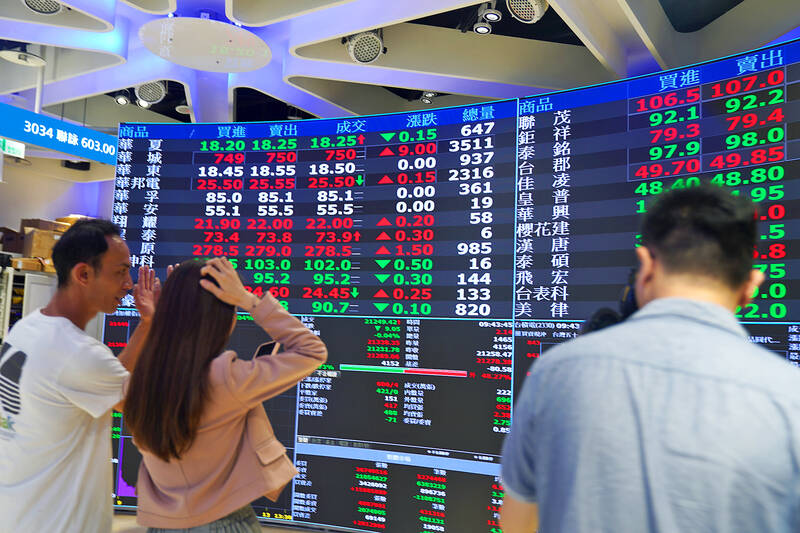The public’s confidence in the economic outlook and stock investment declined slightly this month, but remained positive overall, a survey by Cathay Financial Holding Co (國泰金控) showed yesterday.
Of the respondents, 34.2 percent expect the nation’s economy to improve in the next six months, while 32.1 percent are anticipating negative twists and 29 percent believe things would remain steady, the survey said after polling 16,543 customers online between May 1 and May 7.
That was a small retreat from last month, but stayed in optimistic territory, in line with the government’s business climate monitor system flashing “green,” which indicated steady economic growth, the conglomerate said.

Photo: CNA
The respondents are also upbeat about stock investment, although less optimistic compared with last month, after the TAIEX repeatedly hit record highs this month.
The survey also showed that 41.2 percent of respondents believe the TAIEX would climb higher moving forward, 26.8 percent anticipate corrections, 19 percent expect no changes and 13 percent said they do not know.
The local bourse has received fund inflows from foreign institutional players and mutual funds featuring quarterly or monthly distributions of cash dividends.
Taiwan’s exchange-traded fund market increased to NT$2.05 trillion (US$63.59 billion) as of Tuesday last week, posting an average 13.41 percent return for 60 funds this year, government data showed. The volume suggested a 40 percent spike from NT$1.46 trillion at the end of last year.
The impressive showings came at the cost of savings, such as insurance policies, which Taiwanese use to protect against retirement and old age.
Of the respondents, 34.4 percent said they would raise stakes in stock holdings, 14.9 percent intended to cut positions and 50.7 percent said they would maintain the status quo, the survey found.
Most people, 65 percent, said their income would stay the same in the coming six months, while 22.8 percent are looking at wealth gains and 12.2 percent at wealth erosions, the survey said.
When it comes to employment, 30.4 percent believe the job market would become more difficult going forward, compared with 19.8 percent who think finding jobs would become easier while 42.4 percent had neutral views, it added.
Despite the backdrop, 33.2 percent showed interest in purchasing big-ticket items, 21.7 percent said they would lower their budget and a relative majority, 45.1 percent, would not change their spending, it found.
Furthermore, a relative majority of 42.8 percent said that the need to declare personal income this month would not affect their funds or share holdings, the survey said.

SELL-OFF: Investors expect tariff-driven volatility as the local boarse reopens today, while analysts say government support and solid fundamentals would steady sentiment Local investors are bracing for a sharp market downturn today as the nation’s financial markets resume trading following a two-day closure for national holidays before the weekend, with sentiment rattled by US President Donald Trump’s sweeping tariff announcement. Trump’s unveiling of new “reciprocal tariffs” on Wednesday triggered a sell-off in global markets, with the FTSE Taiwan Index Futures — a benchmark for Taiwanese equities traded in Singapore — tumbling 9.2 percent over the past two sessions. Meanwhile, the American depositary receipts (ADRs) of Taiwan Semiconductor Manufacturing Co (TSMC, 台積電), the most heavily weighted stock on the TAIEX, plunged 13.8 percent in

A wave of stop-loss selling and panic selling hit Taiwan's stock market at its opening today, with the weighted index plunging 2,086 points — a drop of more than 9.7 percent — marking the largest intraday point and percentage loss on record. The index bottomed out at 19,212.02, while futures were locked limit-down, with more than 1,000 stocks hitting their daily drop limit. Three heavyweight stocks — Taiwan Semiconductor Manufacturing Co (TSMC, 台積電), Hon Hai Precision Industry Co (Foxconn, 鴻海精密) and MediaTek (聯發科) — hit their limit-down prices as soon as the market opened, falling to NT$848 (US$25.54), NT$138.5 and NT$1,295 respectively. TSMC's

ASML Holding NV, the sole producer of the most advanced machines used in semiconductor manufacturing, said geopolitical tensions are harming innovation a day after US President Donald Trump levied massive tariffs that promise to disrupt trade flows across the entire world. “Our industry has been built basically on the ability of people to work together, to innovate together,” ASML chief executive officer Christophe Fouquet said in a recorded message at a Thursday industry event in the Netherlands. Export controls and increasing geopolitical tensions challenge that collaboration, he said, without specifically addressing the new US tariffs. Tech executives in the EU, which is

In a small town in Paraguay, a showdown is brewing between traditional producers of yerba mate, a bitter herbal tea popular across South America, and miners of a shinier treasure: gold. A rush for the precious metal is pitting mate growers and indigenous groups against the expanding operations of small-scale miners who, until recently, were their neighbors, not nemeses. “They [the miners] have destroyed everything... The canals, springs, swamps,” said Vidal Britez, president of the Yerba Mate Producers’ Association of the town of Paso Yobai, about 210km east of capital Asuncion. “You can see the pollution from the dead fish.